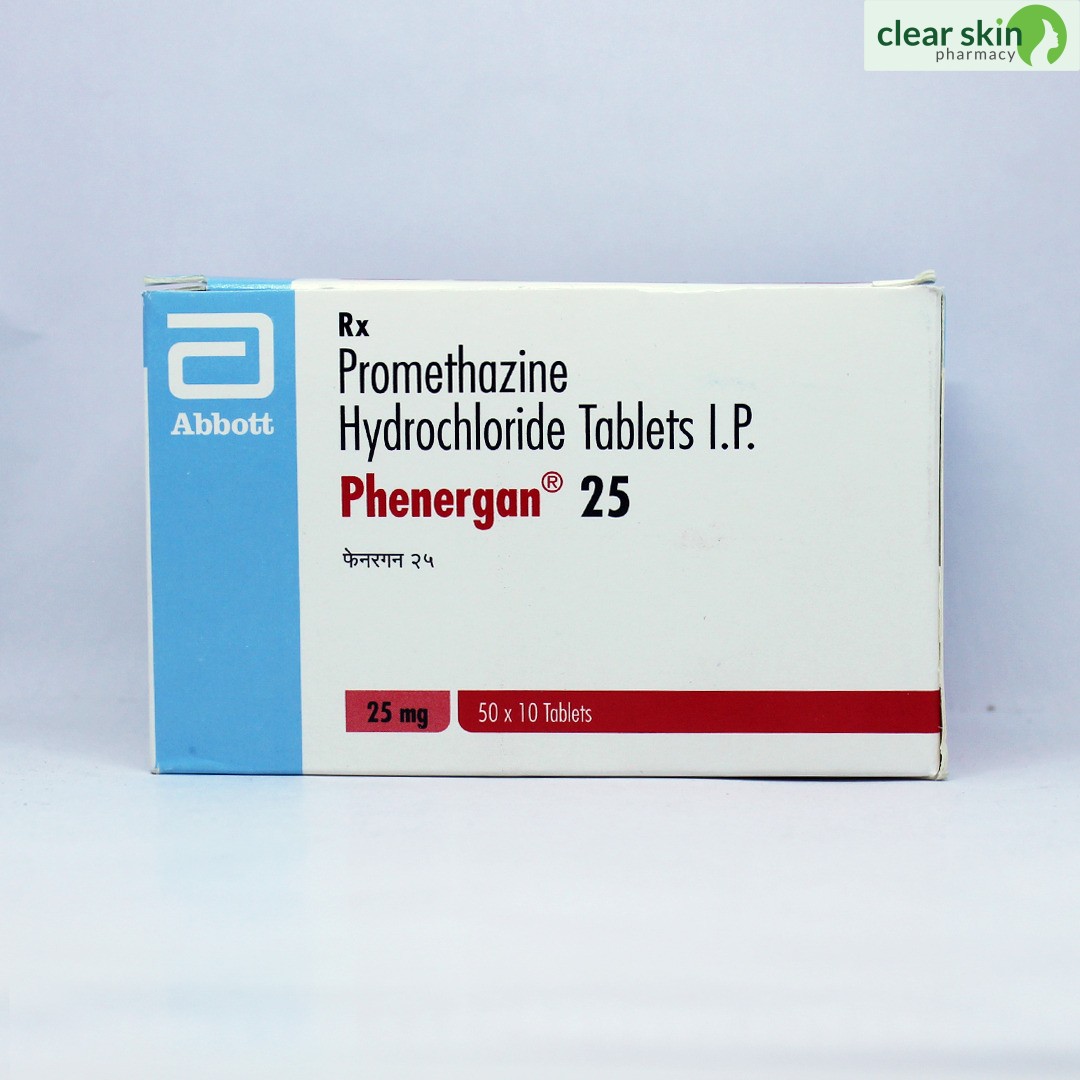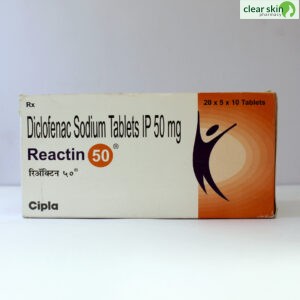PHENERGAN 25 mg
The antihistamine medication PHENERGAN 25 mg is used to treat allergic responses, insomnia, and motion sickness. Allergy, also known as hypersensitivity, is a response of the immune system to normally innocuous foreign chemicals. Insomnia is a sleep disorder characterized by difficulty falling asleep or staying asleep. Travel sickness is a disorder characterized by nausea and vomiting caused by motion during travel.
PHENERGAN 25 mg includes the antihistamine ‘promethazine’ It reduces allergy symptoms by inhibiting histamine activity (chemicals that cause allergic symptoms). Additionally, it has a direct effect on the brain, producing a calming and anti-nausea effect.
The 25 mg dose of PHENERGAN is available as a tablet, syrup, injectable, or suppository. The pills are swallowed whole with a glass of water. The syrup is measured using a measuring cup and then drunk with water. Only a medical practitioner is permitted to deliver the injection. Individuals who are unable to take the medication in any other form are given suppositories. Your physician will establish the amount and length of your treatment. Among the most common side effects of PHENERGAN 25 mg are dry mouth, blurred vision, drowsiness, dizziness, headache, tiredness, disorientation, nightmares, confusion, restlessness, loss of appetite, indigestion, low blood pressure (hypotension), photosensitivity (redness or rashes on sun-exposed skin), and an uncontrollable urge to move the legs (Restless Legs Syndrome). If these side effects persist or worsen, seek immediate medical attention.
Do not take PHENERGAN 25 mg if you are allergic to promethazine or any of its components. Due to the risk of respiratory depression, PHENERGAN 25 mg should not be given to children younger than two years old (slow and ineffective breathing). 25 milligrams of PHENERGAN may promote photosensitivity in the skin (rashes and redness on sun-exposed skin). Therefore, restrict your sun exposure. Because PHENERGAN 25 mg may induce dizziness, you should avoid using heavy machinery or driving while taking it. If you have sleep apnea (a sleeping disorder) or chronic obstructive pulmonary disease (COPD), this medicine may provoke respiratory depression or excessive drowsiness (a lung illness). While using this medicine, alcohol consumption should be avoided. Because PHENERGAN 25 mg tablets contain lactose, inform your physician if you are sensitive to sweets.
Among the diseases for which PHENERGAN 25MG TABLET is effective are allergies, insomnia, and motion sickness.

Medicinal Advantages
The active component in PHENERGAN 25 mg is promethazine, which belongs to the class of medicines known as phenothiazines. It is an antihistamine that inhibits the action of histamines (chemicals causing allergic symptoms). Among other allergy symptoms, it can assist with itching, watery eyes, hives, a runny nose, and sneezing. It also has a direct calming and anti-nausea effect on the brain. It is used for a limited duration to treat insomnia. It can alleviate symptoms such as nausea and vomiting associated with travel or motion sickness.
Use Instructions
The 25 mg dose of PHENERGAN is available in tablet, elixir, injectable, and suppository form. The pill should be swallowed whole with a glass of water. The tablets must not be broken, crushed, or eaten. For optimal results, take the tablets daily at the same time. Using a measuring cup or an oral syringe, measure out the correct quantity of syrup and drink it with a glass of water. Do not measure the syrup with an ordinary spoon. Do not administer injections on your own; they must be done by a medical expert. Suppositories are intended for usage solely in the rectal region. Hands should be cleansed prior to and following each use. Raise the knee of the opposite side to the chest while laying on one side. Then, insert the suppository roughly 12 to 1 inch into the rectum with your finger and hold it there for several seconds. After approximately 15 minutes of laying down, rise cautiously.
Storage
Store in a cool, dry location away from direct sunlight.
PHENERGAN’S SIDE EFFECTS
Among the possible side effects of PHENERGAN 25 mg are dry mouth, blurred vision, drowsiness, dizziness, headache, tiredness, disorientation, nightmares, confusion, restlessness, loss of appetite (anorexia), indigestion (dyspepsia), low blood pressure (hypotension), photosensitivity (redness or rashes on sun-exposed skin), and an uncontrollable urge to move the legs (Restless Legs Syndrome). Consult a physician immediately if these side effects persist or worsen.
Precautions and Warnings in Depth
Do not use PHENERGAN 25 mg if you are allergic to it or any of its constituents. Please advise your doctor if you are taking antidepressants prior to taking PHENERGAN 25MG TABLET, since the combination may cause severe drowsiness. This medication should not be administered to individuals who are unconscious or suffering from severe sleepiness, vertigo, or headache. Tell your doctor if you have difficulty breathing, asthma, bronchitis (lung issues), epilepsy (fits), serious heart problems, liver or kidney problems, a stomach blockage, hearing problems, glaucoma, or Reye’s Syndrome (swelling in the liver and brain in children). Also, inform your physician if you are pregnant or breastfeeding. This drug has the adverse effects of dizziness and drowsiness. Therefore, limit your alcohol consumption and avoid tasks that need mental alertness. Extensive exposure to sunshine or the usage of sun lamps might result in photosensitivity (rashes on sun-exposed skin).
Interactions Between Drugs
PHENERGAN 25 mg may interact with anticholinergic drugs, antidepressants, sedatives (diazepam and zolpidem), and pain relievers (aspirin).
Alcohol may have an effect on the pharmacokinetics of PHENERGAN 25MG TABLET.
Patients with respiratory ailments (asthma), liver or kidney problems, significant cardiac issues, sleep disorders, seizures, hearing problems, glaucoma (eye problems), and Reye’s Syndrome should use promethazine with caution due to drug-disease interactions (swelling in the liver and brain in children).
Safety Suggestions
ALCOHOL
Promethazine combined with alcohol induces tiredness. Avoid consuming alcoholic beverages while taking PHENERGAN 25MG TABLET.
PREGNANCY
Promethazine is a category C controlled substance. It has the potential to damage an unborn child. It should only be administered to pregnant women when absolutely essential. Please consult with a physician. Before prescribing medication to you, your doctor will weigh the benefits and any potential risks.
BREAST FEEDING
Promethazine can be transmitted via breast milk and is harmful to infants. Therefore, unless prescribed by your doctor, do not give Promethazine to breastfeeding mothers.
DRIVING
The potential adverse effects of promethazine include drowsiness and vertigo. Therefore, while using PHENERGAN 25MG TABLET, you should not drive or handle heavy machinery.
LIVER
Promethazine should be used with caution by those with hepatic conditions. Before prescribing medication to you, your doctor will weigh the benefits and any potential risks. Please consult with a physician.
KIDNEY
With caution, promethazine should be delivered to patients with renal disease. Before prescribing medication to you, your doctor will weigh the benefits and any potential risks. Please consult with a physician.
No habit formation
Advice on Diet and Lifestyle
Allergy :
Keep yourself hydrated, particularly if you have a cough or cold. The symptoms of cough, runny nose, and sneezing can be alleviated by consuming room-temperature drinks.
Stress impairs the immune system and raises the likelihood of being ill. A person can relieve stress with frequent exercise, meditation, deep breathing, and progressive muscle relaxation techniques.
Maintain a healthy lifestyle with frequent exercise and 7-9 hours of sleep every night.
Pollen, dust, and other allergens (substances that cause allergies) should be avoided. Certain foods are known to cause allergic reactions in certain individuals.
Maintain proper personal hygiene and a clean environment.
Insomnia :
Maintain a consistent sleep schedule. Daily, including weekends, rise at the same time. Create a tranquil setting for sleeping.
Maintain your activity.
Avoid taking naps.
Before bed, avoid consuming large meals.
Reduce your alcohol intake and give up smoking.
Sickness caused by travel :
Before you go, avoid hot, fatty, and acidic foods. Cereals, apples, bananas, and bread are all excellent alternatives.
Whenever possible, slow down.
Position oneself where there is the least amount of motion, such as in the front of a vehicle, in the middle of a boat or ship, or over an airplane’s wings.
Whenever feasible, open a window to let in some fresh air.
Don’t drink alcoholic beverages. 24 hours before departure and during the duration of the trip.
Recommendations
Because promethazine makes your skin sensitive, you should avoid prolonged exposure to the sun, avoid using sun lamps, apply a high-quality sunscreen, and wear protective clothing while going outside.
Before undergoing an allergy test, you must inform your physician that you are taking PHENERGAN 25MG TABLET.
Other details: This item is non-refundable.
Glossary of Diseases and Conditions
Allergy (hypersensitivity) is a response of the immune system to normally non-harmful environmental chemicals. Allergens refer to these foreign substances. The symptoms include itching, watery eyes, hives, a runny nose, and sneezing. The intensity of an allergic response differs across individuals. Some individuals may experience allergic responses to certain foods and seasonal allergens, such as hay fever. Others, though, can be allergic to pollen or pet dander.
Insomnia is a sleep disorder in which it is difficult to consistently fall or keep asleep. It can be caused by poor sleeping habits, unhappiness, a lack of physical activity, or chronic conditions. It might be acute (short-term) or chronic, depending on the underlying reason (long-term).
Travel sickness is a condition caused by motion nausea when traveling. Upon cessation of motion, the condition normally disappears. Some of the symptoms include nausea, vomiting, disorientation, and fatigue.
FAQs
Promethazine reduces the activity of histamines, the chemicals responsible for allergic responses. It has a relaxing, anti-nausea, and soothing effect since it acts directly on the brain.
Usage of promethazine on a short-term basis is normally indicated. Unless your doctor instructs differently, do not exceed the recommended dosage.
Promethazine should not be administered to children younger than five years old since it may cause respiratory depression (slow and ineffective breathing). Use only if suggested by a child specialist for children over the age of five.
Promethazine might cause drowsiness; thus, do not drive or consume alcohol while taking it. Avoid direct sunlight since it may induce photosensitivity, which can cause rashes on sun-exposed skin.
If it has been less than two hours since your previous dose, take it as soon as you remember. If the next dose is about to be administered, skip the missed dose and take the next dose as usual. Do not double the dose or exceed the stated dosage.
The use of promethazine during pregnancy may harm the unborn child. Therefore, you should only take Promethazine if your doctor has prescribed it.
RLS is a disease characterized by an uncontrollable urge to move your legs, typically in reaction to a painful feeling. Typically, it occurs while seated or lying down in the evening or at night. Moving around temporarily alleviates the discomfort.








Be the first to review “PHENERGAN 25MG 10 tablets”